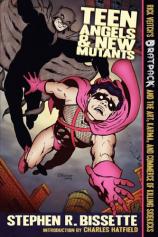Teen Angels & New Mutants
Review
Teen Angels & New Mutants
Rick Veitch's Brat Pack first saw print in 1990, just a few years after Alan Moore's Watchmen and Frank Miller's Batman: The Dark Knight Returns. Cut from the same cloth as those two groundbreaking comics—and inspired in many ways by the 1988 Batman: Death in the Family serial, in which readers called in and voted if Robin should live or die—Brat Pack took a dark, satirical, and very adult look at superheroes and their kid sidekicks. As Veitch saw them, these characters were exploited and abused by their adult counterparts, by the comics industry that created them, and even by their readers and "fans."
While Watchmen and Dark Knight have been endlessly analyzed and written about for the past two decades, Brat Pack has not enjoyed the same level of discussion. With his new book, author and artist Stephen R. Bissette (best known for his work on Swamp Thing, on which he occasionally collaborated with Veitch), corrects that oversight.
Bissette, one of comics' most important historians and commentators, first started writing what would become Teen Angels & New Mutants as an essay for inclusion in a planned (but then canceled) limited-edition graphic novel collection of Brat Pack. That essay has been dramatically expanded into book-length form, and that's actually a good thing, since it more than stands on its own. In fact, you don't need to have read Brat Pack to understand this book, because Teen Angels & New Mutants is less about Brat Pack than about the cultural forces that led to Brat Pack's creation.
You see, just as Brat Pack was a commentary on the exploitation of children, Bissette's book-length examination of the societal elements that created the need for that commentary shines a harsh light at our culture and the many ways we take advantage of the younger members of our society, and how that has changed over time. Along the way, Bissette looks at film, books, the advertising industry, comics (both mainstream and underground), societal norms and taboos, and real cases of exploited children. He cites hundreds and hundreds of examples, all thoroughly documented, and they add up to a damning portrait of our own society, once that exploits the youngest and weakest citizens for sex, money, and power.
Bissette also paints a vivid picture of Veitch's life (both personal and professional) leading up to the creation of Brat Pack. And, since Bissette was present at the genesis of Brat Pack—and the comics he worked on were an essential part of the genre's growth in the 1980s—the book also has a little flavor of autobiography thrown in for good measure.
With that incredibly detailed and well-thought out perspective, Teen Angels & New Mutants is an eye-opening and illuminating amalgamation of scholarship, media criticism, history, and biography. Itis an astonishing, unique, vital book. There's never been a work of comics-related commentary like it, and I doubt you'll find many works of media criticism that tackle a subject with such a detailed, damning eye. Give it a try and be illuminated, and quite possibly disgusted by the way society treats the young. You'll never look at movies, music, advertising, books, comic books, or your neighbors quite the same way.
Reviewed by John R. Platt on August 2, 2012
Teen Angels & New Mutants
- Publication Date: February 25, 2011
- Genres: Graphic Novel, Nonfiction
- Paperback: 412 pages
- Publisher: Hollywood Comics
- ISBN-10: 1935558935
- ISBN-13: 9781935558934



